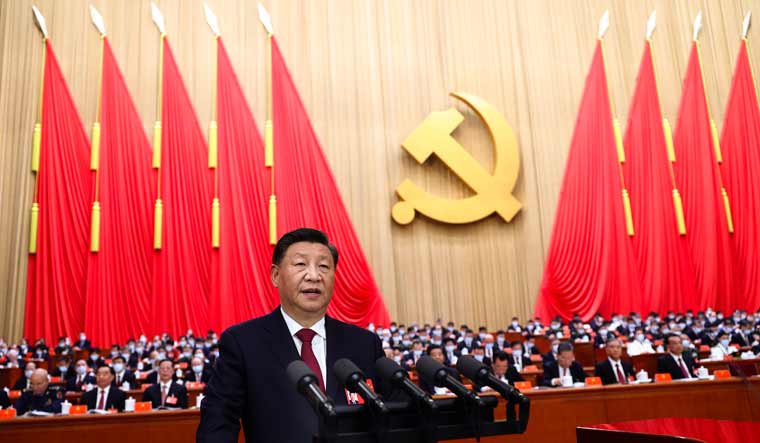As the Communist Party of China (CCP)’s 20th national party congress closing ceremony commences on Saturday, Communist Party of India (CPI) general secretary D. Raja said Chinese President Xi Jinping entering third term is a landmark event at a time when imperialist forces are gaining strength and warmongering has increased triggered by US military presence, particularly in the Indo-Pacific region.
“What purpose does the US have to establish a military presence in the Indo-Pacific region, Korean Peninsula? The rise of imperialist forces is a matter of concern for the world and the Russia-Ukraine crisis is the biggest example,” he told THE WEEK.
If the CCP sends an invite after the party congress, the Indian left parties may oblige. “We participated in a meeting after the 19th party congress. We do not participate in the party congress but once it’s over, communist parties across the world can get together,” he said.
The world communist meetings have been of keen interest to Indian left parties. As Xi rises in stature both within and outside China, the communist parties around the world are expected to rally behind him. “ China has achieved its goals in poverty alleviation. It was a stated goal in its five-year plan. It has its internal problems (Hong Kong and Taiwan included ), but Xi’s focus on redistribution of wealth pursuing common prosperity to end inequality is a model to be appreciated,” said Raja.
Renmin Lingxiu (people’s leader), core leader, chairman of everything and variety of titles have been bestowed on Jinping, but the most important ones, that he will hold once again are general secretary of the Communist Party of China’s central committee, president of China and chairman of the party’s central military commission.
The 200 odd voting members of the central committee and 176 alternate members (non-voting ) are expected to make Xi their leader giving him a third term. The lineup for the politburo standing committee is likely to become clear as soon as the 20th Communist Party of China National Congress enters its last leg on October 23. The Great Hall of the People in Beijing will witness an unprecedented moment as Xi enters another decade of his rule, unlike any of his predecessors after the Chinese communist party founder Mao Zedong died in 1976.
Those witnessing it are the 2,296 delegates invited to the 20th CPC National Congress but this time due to Covid protocols, not many foreign invites have been sent. CPC events are held post the party congress for foreign delegates where Indian left parties have participated in the past, last one being the event after 19th part of congress. CPI(M) general secretary Sitaram Yechury and CPI leaders virtually joined the centenary celebrations of the CCP in 2021.
The foreign invitees to CPC events are mostly three sets of people—those who have political affiliation with a communist party within their country and may or may not hold an office, those who hold a position in any communist party and also those with whom the United Front Work Department has built good relations over years. The third category is an evolving list as China continues to become stronger in its influence operations around the world.
This time, the foreign delegates wishing Xi a third term are from South Africa, Maldives, Barbados, Pakistan, Nepal, Bosnia, South Sudan, Seychelles, Serbia, Japan, Germany, Italy, Cambodia to name a few.
But those witnessing Xi’s rise most closely are leaders from Taiwan—around 10 Taiwanese representatives were chosen to the 20th party congress, similar number as the 19th party congress event. They are people who have roots in Taiwan but moved to China’s mainland later, some have families still living in Taiwan and most of them travel between China and Taiwan frequently organising exchanges between the two sides. This aspect will gain significance in Xi’s third term as he wants to fulfill his unification dream, something the Taiwanese government and its people have outrightly rejected.
Xi’s third term will have many challenges ahead—economic, military and diplomatic as he also looks to building China’s economy independent of the US, a tall task given the yuan and dollar are interlinked and any dream of building the yuan as an international currency is still a far cry. Xi has to deal with the economic crisis within his country post-pandemic before he looks outward.
The next task will be to build the Chinese military at par with the US as despite the technological push and modernisation efforts, the comparisons are difficult on many fronts given the US also has a greater strategic advantage and diplomatic reach.
Meanwhile, closer to the last day of the party congress, apart from Xi’s rise, all eyes are also on who will be in his new team—the main positions to watch out for are Chinese premier as incumbent Li Keqiang may step down now or retire in March; his possible successor Wang Yang, 67, chairman of China People’s Political Consultative Conference, the top political advisory body and who may be head of China’s legislature, National People’s Congress. A likely candidate is Wang Huning, a close aide of Xi, as chair of NPC.
All eyes are also on those who may make it to the politburo standing committee - probables are Li Qiang, party chief of Shanghai; Chen Miner, party chief of Chongqing and considered a technocrat and Ding Xuexiang, director of central committee's general office. Within the CMC, Xi himself will take the lead as the all-powerful leader.




